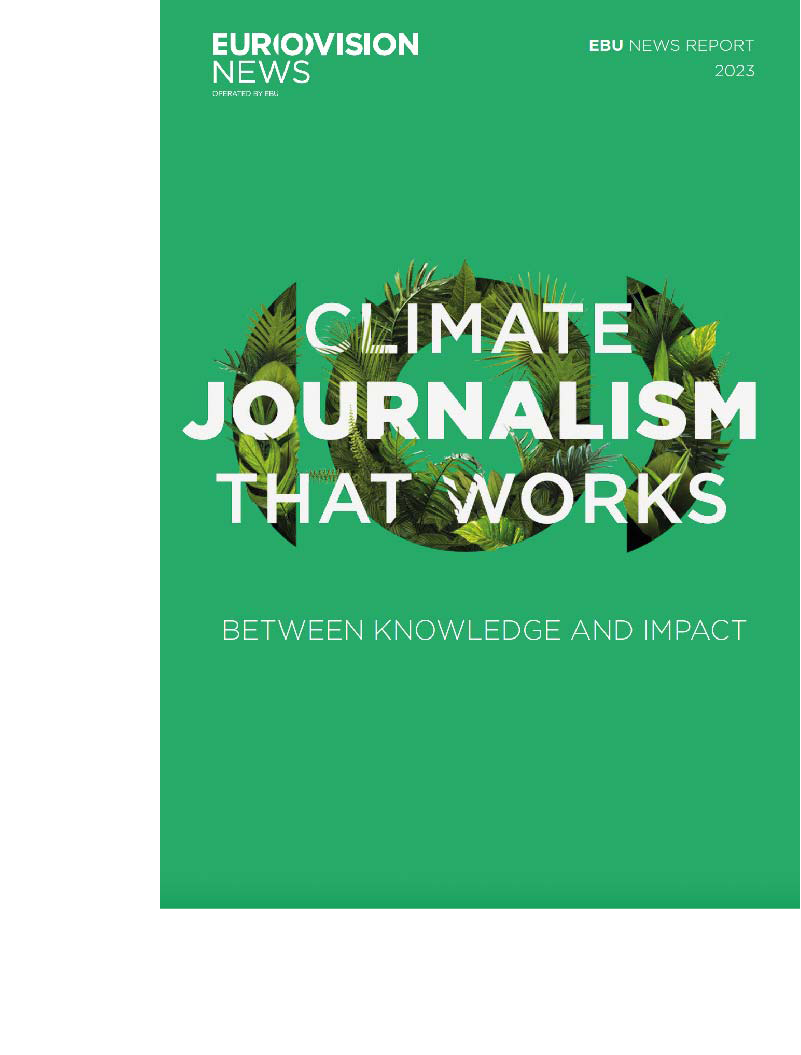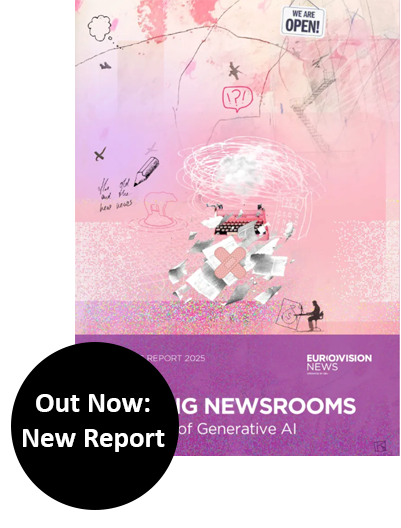Jay Rosen, journalism professor with New York University, recently joined the Board of the new Bonn Institute for Journalism and Constructive Dialogue. His reasoning: If journalism is to survive in a polarized world, it has to provide perspectives and solutions. In this interview, initially published by Medieninsider, Rosen talks about attacks on democracy, diversity, innovation, and why the media industry is particularly reluctant to change.
Medieninsider: American journalism has been pretty hung up with Donald Trump, now he is gone, at least as a president. What has this done to the industry?
Jay Rosen: Donald Trump was good for ratings and for subscribers, he was good to create interest in the news, but I don’t think anyone misses the kind of frenzy everyone went into when he tweeted something. The more serious question is, what happens when he runs again? Because his whole approach is to destroy journalism, to destroy trust in it. He tells his supporters, the press is critical with me, because they hate you. How should journalism respond to that? I think the industry has been reluctant to face this question, also because the stakes are so high.
But the industry must have learned something from the Trump years?
Our journalists did learn to say sometimes: This is a lie. They didn’t do that before that often. To simply offer a platform to someone who proceeds to supply disinformation is something journalists should not participate in. So the challenge is, how to avoid amplifying disinformation while still covering the news. The press is finally waking up to the fact that some people are antidemocratic. There are not just populists but fascists in that crowd. There is a real danger here to America democracy, and it is coming from an awakened right wing. Right now, the mainstream press doesn’t know what to do about it. A complicating factor is: The right wing has its own media system now and it doesn’t necessarily need the rest of the press. In this ecosystem things that we would call misinformation and disinformation are absolutely believed and promoted. There are actions being taken on the basis of misinformation and disinformation, like changes in law and governance, that arise from politicized fiction. Fox news is an extremely important actor in this.
Has the significance of Fox News decreased now that Trump is gone or has it increased?
Increased! Now that Trump is out of the way, Fox is the home of his supporters. In a way Tucker Carlson, who is the most powerful figure in the Fox lineup, has taken over from Trump as a nightly presence. It is a very potent organization.
Are these really two different worlds of journalism, or is there a crossover of journalists?
There is very little of it, a few journalists who start in conservative publishing like for example the National Review might change to other media like CNN or one of the big newspapers. But an increasing part of the right-wing media sphere is consumed with fiction and things that never happened, like the stolen election. Once you have written stories on premises that are false, it is very hard for that person to shift somewhere reputable, because they are on record with it.
Many European countries have strong public service media. We like to believe that a polarization like that could never happen here.
That is a huge advantage and does make it harder for this extreme propaganda approach to reach as many people. But I wouldn’t go so far as to say it couldn’t happen. There are political forces on the extreme right wing, also in Germany. If they can discredit the public service media complex enough, if they can wip up resentment against paying the fees that are necessary to keep it going, they may be able to weaken the political support for public service broadcasting as part of their political campaign against elites. That would erode this advantage. You can witness this in the United Kingdom, where the Conservatives are attempting to push back the BBC.
It is hard to overemphasize how much hatred for the media is itself a huge mobilizing factor in the politics of the right wing
What could the US teach the world about doing journalism in a polarized society?
We don’t have anything to teach the world with that. About 25 to 30 percent of the American voters are in many ways lost to mainstream journalism. It is not that they don’t use it. They mistrust everything they see. And it even goes beyond that: If a story appears in the mainstream press, it is a reason to disregard or disbelieve it. This is active distrust. It is hard to overemphasize how much hatred for the media is itself a huge mobilizing factor in the politics of the right wing. Nationalist populism generates power by raging at elites, and the central elite in that system is journalists. Resentment against the press is a political mechanism.
What kind of consequences do reputable Media draw from that? Have they changed their approach?
I tend to say they are not doing enough. One thing we have seen is that how much the Republican Party has taken on the Trump attitude and approach. It is now the Republican way of operating, even if Trump is not involved. For example, Republicans are trying to make it harder to vote. Or they are making it easier for public officials to manipulate the vote. One of the things big news organizations are doing is they are putting a lot more people on the voting beat, covering changes in the voting system. The Washington Post has a new democracy desk, AP is doing something similar
Do journalists have to stand up more for democracy?
Journalists have to become more explicitely pro-democracy. They have to undertake the defense of democracy. That includes things like reporting about voting but also about disinformation. When you have a party that is turning anti-democratic, and you are supposed to cover that party fairly, you have a problem, because you are also supposed to be pro-democracy. Unfortunately, in the States being pro-democracy is increasingly seen equivalent with being pro Democrats.
In 2018 you spend a summer in Germany studying “German press think”. What is it that makes German press think different?
One of the pillars of German press think is that journalism should help to prevent the return of totalitarianism. We don’t have that in the US.
Funnily, this is exactly what Americans taught Germans after the Second World War. So, is it time now for the American press to learn from Europeans?
That’s right. I don’t think in any of these problems we have talked about, American journalists are the leaders.
Newsroom leaders have more and more to decide will they have the view from nowhere to prevail or will they have the “diversify the newsroom project” to prevail?
These pressures come at a time when many American newsrooms seem to be consumed by internal debates, for example about diversity and identity.
The campaign to diversify the American newsroom has gone on for about 30 years, even longer. The warning that the news media is too white goes back 50 years. The campaign hasn’t worked. In positions of power, you don’t see any real movement. Lots of minority journalists got frustrated with that and quit.
Even with Dean Baquet having been the first black editor of the New York Times?
Yes. In fact, just last year they had to do this big report on newsroom culture. The younger generation of minority journalists is more committed to these changes, they are less likely to accept excuses. They have also more tools for expressing themselves, they can always go to the internet. There is now a kind of confrontation happening between rhetoric and results. It is revealing this contradiction at the heart of the diversify the newsroom process: Journalists are being recruited into the newsroom to bring in a different perspective to the news. Once they are hired, they are told to check their perspective at the door and show that they can be a professional like everyone else with a view from nowhere, as I call it. Newsroom leaders have more and more to decide will they have the view from nowhere to prevail or will they have the diversify the newsroom project to prevail.
The debate about impartiality in journalism is alive and well in Europe, too. What do you think about it?
I have to be careful when I talk about it. It depends a lot on what you mean by impartial or objective, in the United States that tends to be the term. We need journalists that are intellectually honest. If objectivity means, let’s use facts rather than arguments, that is important. If objectivity means getting a larger picture, that is extremely important as well. Impartiality means trying to describe what the situation really is instead of what we prefer it to be, that is super important and very basic to journalism. But if impartiality means you are above it all and you have no perspective, that is a lie. If you think of yourself as the only one who doesn’t have an agenda because you are a journalist, it is a dangerous thing to believe.
The BBC has reworked the concept to make it fit their purposes, their regulator Ofcom now calls it due impartiality, meaning it has to acknowledge the context.
They discovered that the old concept didn’t work in daily newsroom practice. They saw that their managers who run the desks where doing this with climate change, to allocate the same time to climate change proponents and deniers. That is not what they wanted, so they went through this process. If you have two parties and one of them is powered by fictions, lies, and disinformation, simply reporting on what they do feels and sounds biased.
If our newsrooms cannot learn how to become more helpful in problem-solving, they won’t survive as influential
The former editor of The Guardian, Alan Rusbridger, says that the media has failed in the biggest story of our times: climate change reporting. Do you agree?
Today’s news system, at least the one we have in the US, is not designed to create public understanding. It is designed to produce new content every day. With climate change the first step that is required is learning, you need background knowledge, without this the news about climate change doesn’t make any sense. But our news system is not designed to create background knowledge but to report what’s new today. It is a new challenge. Journalism has to become more problem-solving.
Is this why you decided to join the board of the new Bonn Institute for Journalism and Constructive Dialogue?
Yes. If our newsrooms cannot learn how to become more helpful in problem-solving, they won’t survive as influential. It is a huge challenge for the profession, this will be around for the next 20 or 25 years. It is not like this week’s flavor of ice-cream. For us journalists it used to be that our job was to uncover problems, to put a spotlight on them, and it was governments’ job to solve them. This is no longer appropriate. But the move toward solutions journalism is happening. In the US the Solutions Journalism Network has been active for 15 years. They have reached 30 000 journalists and collaborated with over 300 newsrooms. The movement is slowly spreading. Even small changes can take years.
Can you please give us an example how this is reflected in American journalism?
With mass shootings it used to be that there was all this publicity about the shooter. You could read his bio in all detail. This encouraged other shooters to take up their guns. Critics said to major networs: You cannot feature the shooters as the star of the story without encouraging more violence. Now the stories are much more about the victims. This is a response to the criticism. It took 15 years. The adoption curve in journalism is absurd, it takes too long. We don’t have that long. The 2024 election is around the corner, for example.
Why is this industry so slow in adopting change?
One reason is, journalism is a team sport, in most cases it is collaborative. You need everybody to be on the same page on what our job is. It is a consensus practice. If the consensus becomes a problem, journalists are reluctant to give up their intellectual tools even when they are broken, because they need everybody to operate in the same way. There is the production routine after all, deadlines have to be met. Additionally, journalists get a lot of bad faith criticism from people who are trying to undermine the press. This is why sometimes they get defensive about criticism. Also, there is a cultural thing: journalists are a herd of independent minds, they are people who think alike but also think of themselves as individuals who make their own choices. This is how White House correspondents work: in their minds they are intensely competitive with each other at doing exactly the same thing. But the business prospects for the press are dim if they can’t help solving problems. When it is done properly, you often see in the numbers that people are paying attention and their satisfaction with the product grows. If those metrics show that people are paying attention and they find this kind of journalism more valuable this is a huge thing.
Do we have to revolutionize journalism education then?
Slowly journalism education is changing. We are now seeing programs that are focused on innovation, teaching people how to become innovators in the newsroom and in these companies. That’s not the way it has been for a long time. Journalism schools were usually trailing changes rather than the other way around. It would be a significant change if they led the way.
Do we also need more executive education?
Leaders of news organisations have to become smarter with a lot of things. There is a lot of pressure around developing the business of news. The news industry had remained remarkably stable and profitable for a very long time. That created a culture that isn’t build for rapid adjustments and changes, it is not exactly agile. That the news industry has to learn from the tech industry.
Is there anything else the news industry could learn from the tech industry?
Iteration. This is a buzzword, I usually try to avoid those. Because the costs of trying things have fallen immensely in the digital era, you can use iteration. See what works, improve it. Innovation used to be creating a new food section. Now it is about quickly changing your product in response to user data. Incorporating your audience in the production of the news is also a whole new world. Previously the job of the audience was to sit in their seat and consume the news. The job of journalists was, finish your story, job done. Now your job is: how to get it to the people who really need it. That is something you cannot really outsource. In job interviews it used to be that the editors who did the interviewing had all the skills, now they ask the job seekers explicitely about the skills they themselves don’t have.
So, it is all about figuring out user needs. What are the user needs journalism can and should fulfill?
People do consume news because they want to know what’s going on. They need journalism to know what is true and not true, what they can ignore and not ignore. But also: They want to know, how are we getting out of this mess? They need a reason why to keep paying attention.
Interview: Alexandra Borchardt, the text was first published in German by Medieninsider on 20th May 2022.



